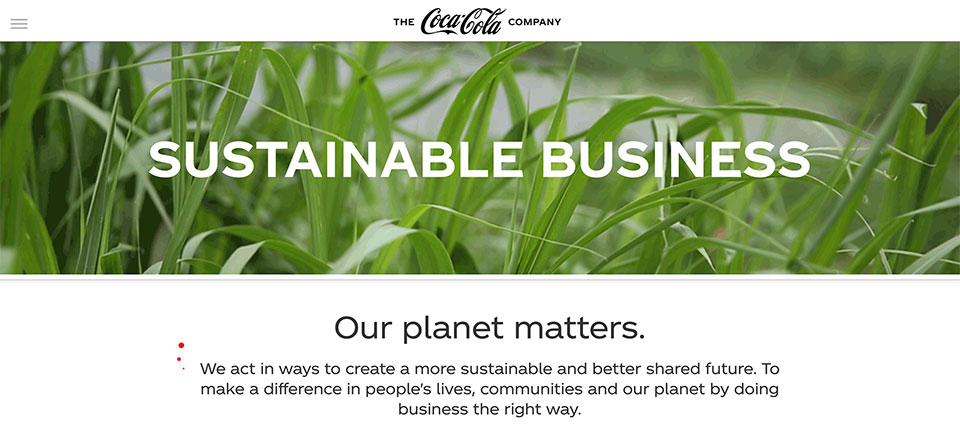Contact: Sharon Donovan
Communications Director
Earth Island Institute
sharondonovan@earthisland.org, (510) 859-9161
Washington, D.C. (June 8, 2021) — On the grounds of false and deceptive advertising, Earth Island Institute today filed a lawsuit against the Coca-Cola Company, the American multinational beverage corporation that portrays itself as sustainable and environmentally friendly while generating more plastic pollution than any other company in the world. The filing coincides with World Oceans Day, in recognition of the devastating impacts plastic pollution has on marine life, oceans, and coastal communities, and the dire need for companies like Coca-Cola to take responsibility for those impacts.
On its website and in advertising campaigns on television, in print, and across social media platforms, Coca-Cola claims that “our planet matters.” “Scaling sustainable solutions . . . and investing in sustainable packaging platforms to reduce our carbon footprint,” the company asserts. A “World Without Waste” declares the headline in one marketing campaign. Yet almost anywhere you look there’s a plastic Coca-Cola bottle trashing the public park, washed up on the beach, or piled in a mountain of plastic at a waste processing facility. What these advertising campaigns ultimately amount to is a mountain of greenwashing.

In fact, Coca-Cola was named the number one corporate plastic polluter for the past three years according to the Break Free From Plastic Global Cleanup and Brand Audit report. According to the report, 13,834 branded Coca-Cola plastics were recorded in 51 countries in 2020, reflecting more plastic than the next two top global plastic polluters combined.
“Coca-Cola has long been in the business of portraying itself as stewards of the environment while pointing to consumers as the source of plastic pollution. But it is Coca-Cola, not consumers, that chooses to use chart-topping amounts of plastic for its products. It is time this company is held accountable for deceiving the public,” said Earth Island Institute General Counsel Sumona Majumdar. “The more consumers become aware of plastic pollution, the more the company doubles down on its purported commitment to the environment to appease those concerns, but the actual results of their efforts tell a very different story. The company needs to come clean and be honest with consumers.”
Earth Island Institute has filed the case in the District of Columbia Superior Court, alleging that Coca-Cola is in violation of the District of Columbia’s Consumer Protection Procedures Act (CPPA). The CPPA is a consumer protection law that prohibits a wide variety of deceptive and unconscionable business practices. The statute specifically provides that a public-interest organization, like Earth Island, may bring an action on behalf of consumers and the general public for relief from the unlawful conduct directed at consumers. If successful, this lawsuit will prevent Coca-Cola from falsely advertising its business as sustainable, among other things.
“For 12 years we have advocated for a more just, equitable world free of plastic pollution and its toxic impacts, driving corporate responsibility to stop plastic pollution at the source,” said Julia Cohen, MPH, co-founder and managing director at Plastic Pollution Coalition, a project of Earth Island Institute and a global alliance of more than 1,200 organizations, businesses, and thought leaders in 75 countries. “We want the Coca-Cola company to stop the greenwashing and false claims, be transparent about the plastic they use, and be a leader in investing in deposit and refill programs for the health of humans, animals, waterways, the ocean, and our environment.”
As a fiscally sponsored project of Earth Island Institute, Plastic Pollution Coalition is at the organization’s core of educating consumers about plastic pollution, including in the District of Columbia, and engaging in advocacy related to environmental and human health impacts from plastic.
Plastic pollution is a global problem and threatens human and environmental health on a massive scale, from the plastic-producing petrochemical plants that disproportionately impact communities of color and low-income communities to the plastic waste that is often dumped in developing countries to the toxic microplastics invading our bodies, which have been shown to contribute to cancer, neurotoxicity, reproductive issues, endocrine disruption, and genetic problems. Consumers are becoming increasingly aware of these issues and are too often deceived by companies like Coca-Cola, which claims that they are reducing their plastic footprint on the earth.
Earth Island Institute is represented by Richman Law & Policy, which specializes in consumer protection law.
World Oceans Day is Tuesday, June 8.
More information here.
###